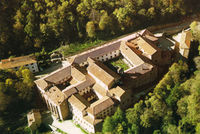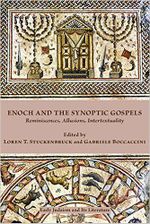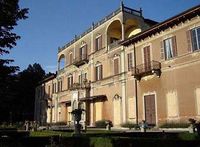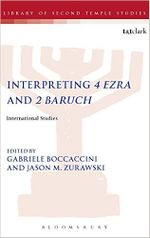Enoch Seminar (2001-), learned society
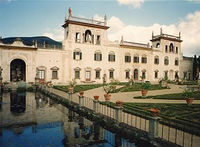

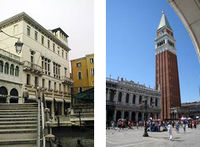

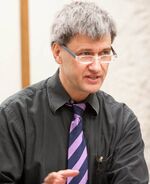
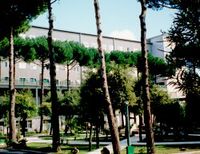
The Enoch Seminar is an academic group of international specialists in Second Temple Judaism and Christian Origins, who share the results of their research in the field and meet to discuss topics of common interest. In addition to the biennial Enoch Seminars, the group has launched three other series of international meetings: the biennial Enoch Graduate Seminar (since 2006), the yearly Nangeroni Meetings (since 2012), and the occasional Enoch Colloquia (since 2017). The group also runs an online journal (Enoch Seminar Online), 4 Enoch: The Online Encyclopedia of Second Temple Judaism (since 2009), and the yearly Enoch Seminar Reception at the SBL (since 2012).
History
Founded in 2001 by Gabriele Boccaccini, the Enoch Seminar focuses on the period of Jewish history, culture and literature from the Babylonian Exile to the Bar-Kochba revolt—the period in which both Christianity and Rabbinic Judaism have their roots. The goal is to tear down the misleading walls of separation that still divide this field of research, recovering the unity and integrity of the period. Enoch is the symbol of this inter-canonical and inter-disciplinary effort, as he is present of each and all the canons that anachronistically divide sources from the period: Old Testament, Apocrypha, Pseudepigrapha, Dead Sea Scrolls, Jewish-Hellenistic literature, New Testament, Apostolic Fathers, etc.
Participation at the Enoch Seminar is by invitation only and is restricted to University professors and specialists in Second Temple Judaism and Christian Origins who have completed their PhD. To graduate students and PhD candidates, the Enoch Seminar offers a biennial meeting (the Enoch Graduate Seminar).
The Enoch Seminar is chaired by Gabriele Boccaccini (University of Michigan) and is made possible by fundings from the University of Michigan and from the Michigan Center for Early Christian Studies and the Alessandro Nangeroni International Endowment.
Enoch Seminar Board of Directors:
- Gabriele Boccaccini, University of Michigan, USA
- Kelley Coblentz Bautch, St. Edward’s University, USA
- Lorenzo DiTommaso, Concordia University Montreal, Canada
- Esther Eshel, Bar-Ilan University, Israel
- Matthias Henze, Rice University, USA
- Pierluigi Piovanelli, University of Ottawa, Canada
- Carlos A. Segovia, Camilo José Cela University, Spain
- Loren T. Stuckenbruck, University of Munich, Germany
- Jason M. Zurawski, University of Groningen, Netherlands
Meetings (chronology)
2001
- 2001 (Florence, Italy) - First Enoch Seminar: The Origins of Enochic Judaism
2003
- 2003 (Venice, Italy) - Second Enoch Seminar: Enoch and Qumran Origins
2005
- 2005 (Camaldoli, Italy) - Third Enoch Seminar: Enoch and the Messiah Son of Man
2006
- 2006 (Ann Arbor, MI) - First Enoch Graduate Seminar
2007
- 2007 (Camaldoli, Italy) - Fourth Enoch Seminar: Qumran and the Mosaic Torah
2008
- 2008 (Princeton, NJ) - Second Enoch Graduate Seminar
2009
- 2009 (Naples, Italy) - Fifth Enoch Seminar: Enoch, Adam, Melchisedek: Mediatorial Figures in 2 Enoch
2010
- 2010 (July 19-23; Budapest, Hungary) - Third Enoch Graduate Seminar
2011
- 2011 (Milan, Italy) - Sixth Enoch Seminar: 2 Baruch, 4 Ezra: Late First Century Apocalypticism
2012
- 2012 (Notre Dame, IN) - Fourth Enoch Graduate Seminar
- 2012 (Milan, Italy) - First Nangeroni Meeting: The Seleucid and Hasmonean Periods and the Apocalyptic Worldview
- 2012 (Chicago, IL) - 1st Enoch Seminar Reception at the SBL
2013
- 2013 (Camaldoli, Italy) - Seventh Enoch Seminar: Enochic Influences on the Synoptic Gospels
- 2013 (Baltimore, MD) - 2nd Enoch Seminar Reception at the SBL
2014
- 2014 (Montreal, Canada) - Fifth Enoch Graduate Seminar
- 2014 (Dor, Israel) - Second Nangeroni Meeting: Voice of Jacob: Early Jewish Texts and Traditions in Christian Transmission
- 2014 (Rome, Italy) - Third Nangeroni Meeting: Rereading Paul as a Second-Temple Jewish Author
- 2014 (San Diego, CA) - 3rd Enoch Seminar Reception at the SBL
2015
- 2015 (June 15–19; Milan, Italy) - Fourth Nangeroni Meeting: Early Islam: The Sectarian Milieu of Late Antiquity?
- 2015 (June; Milan, Italy) - Eighth Enoch Seminar: Apocalypticism and Mysticism
- 2015 (June; Naples, Italy) - Fifth Nangeroni Meeting: Second Temple Jewish Paideia in Its Ancient Near Eastern and Hellenistic Contexts
- 2015 (Nov; Atlanta, GA) - 4th Enoch Seminar Reception at the SBL
2016
- 2016 (May; Austin, TX) - Sixth Enoch Graduate Seminar
- 2016 (Jun; Camaldoli, Italy) - Sixth Nangeroni Meeting: John the Jew
- 2016 (Jun; Rome, Italy) - Seventh Nangeroni Meeting: The Early Reception of Paul the Jew
- 2016 (Nov; San Antonio, TX) - 5th Enoch Seminar Reception at the SBL
2017
- 2017 (Jun 11-16; Florence, Italy) - Eighth Nangeroni Meeting: New Perspectives and Contexts in the Study of Islamic Origins
- 2017 (Jun 18-23; Camaldoli, Italy) - Ninth Enoch Seminar: From tôrāh to the Torah: Variegated Notions of Torah from the First Temple Period to Late Antiquity
- 2017 (Nov 16-18; Boston, MA) - 1st Enoch Colloquium and 6th Enoch Seminar Reception at the SBL
2018
- 2018 (Lausanne, Switzerland) - Seventh Enoch Graduate Seminar
- 2018 (June 10-15; Milan, Italy) - Ninth Nangeroni Meeting: The Period of the Middle Maccabees: from the death of Judas through the reign of John Hyrcanus (ca. 160–104 BCE)
- 2018 (June 17-22; Italy) - Tenth Nangeroni Meeting:Gender and Second Temple Judaism
- 2018 (Nov 17-20; Denver, CO) - 7th Enoch Seminar Reception at the SBL
2019
- 2019 (June 9-14; Florence, Italy) - Tenth Enoch Seminar: Enoch and Enochic Traditions in the Early Modern Period: Reception History from the 15th Century to the End of the 19th Century
- 2019 (June 16-20; Gazzada, Italy) - Eleventh Nangeroni Meeting: 3rd Early Islamic Studies Seminar, New Perspectives and Contexts in the Study of Islamic Origins II
- 2019 (Nov 23-26; San Diego, CA) - 8th Enoch Seminar Reception at the SBL
2020
- 2020 (June 29 - July 2; online) - 2020 Enoch Seminar Online: Concepts of Evil in Second Temple Judaism and Early Christianity
- 2020 (Oct; online) - Conference on Aramaic Enoch
- 2020 (Nov 11-12; online) - Fourth Enoch Colloquium and 9th Enoch Seminar Reception at the SBL
2021
- 2021 (Jan 11-14; online) - Nangeroni meeting (online) on John the Baptist, in collaborazione with the Journal for the Study of the Historical Jesus
- 2021 - (Apr 29-30; online) - Eighth Enoch Graduate Seminar
- 2021 (May 23-27; online) - Eleventh Enoch Seminar: Ancient Apocalypticism: History, Method, and Reception, in collaboration with the University of Munich, Germany
- 2021 (July 18-22; online) - Twelfth Nangeroni Meeting: Constructions of Gender in Late Antiquity
- 2021 (Oct 25-27; online) -- Was Paul an Apocalyptic Jew?
- 2021 (Nov 19; San Antonio) -- Luke and Acts With(in) Second Temple Judaism
2022
- 2022 (Jan 10-13; online) -- Studies in Second Temple Judaism: A Global Enterprise (Jan 10-13, 2022)
- Jan 31-Feb 3: Present and Future Perspectives on the Study of Second Temple Judaism in Ibero-America
- March 3: RES Virtual Review - Intro to Apocalypticism (Oegema)
- April 11-13: Fellows closing with John Collins/AJ Levine
- April 28: Pharisee in J&C dialogue/ RES Virtual Review - Review of Pharisees (Sievers & Levine)
- 2022 (May 29 - Jun 3; Norway) -- "Virtus et Humanitas: Virtues and Values in Greco-Roman, Jewish and Christian Paideia at the Turn of the Common Area"
- 2022 (June 26-30; Rome, Italy) -- Luke and Acts Wit(in) Second Temple Judaism
- July 14: RES Virtual Review
- October 6: RES Virtual Review
- October 17-18: MCECS Music & Christianity
- November 18: ES Colloquium at SBL
... ...
2023
- ???? (Naples, Italy) - Thirteenth Nangeroni Meeting: Sibylline Oracles
2024
2025
- Jan 7 - "Reading the New Testament Within Judaism"
- Mar " Donne di authority
- Salome Alexandra (Boccaccini;
- Marianne
- Berenice (Tal Ilan;
- Jun 3 - "Reading the New Testament Within Judaism"
- Paul
- James, Jude, 1 Peter
- Mark
- Matthew
- Luke-Acts
- John
- Revelation
- Didache
- Jun - Nangeroni Meeting - Gazzada
2026
- 2001 (June 20; online) -- Happy Birthday, Enoch Seminar! (25th anniversary)
- Material Cultural (Gardner) Fidanzio?
- Digital Humanities (Minisini, Stuckenbruck)
2031
- 2021 (June 20; online) -- Happy Birthday, Enoch Seminar! (30th anniversary)
Meetings of the Enoch Seminar (2001-)
- 2001 (Florence, Italy) - First Enoch Seminar: The Origins of Enochic Judaism
- 2003 (Venice, Italy) - Second Enoch Seminar: Enoch and Qumran Origins
- 2005 (Camaldoli, Italy) - Third Enoch Seminar: Enoch and the Messiah Son of Man
- 2007 (Camaldoli, Italy) - Fourth Enoch Seminar: Qumran and the Mosaic Torah
- 2009 (Naples, Italy) - Fifth Enoch Seminar: Enoch, Adam, Melchisedek: Mediatorial Figures in 2 Enoch
- 2011 (Milan, Italy) - Sixth Enoch Seminar: 2 Baruch, 4 Ezra: Late First Century Apocalypticism
- 2013 (Camaldoli, Italy) - Seventh Enoch Seminar: Enochic Influences on the Synoptic Gospels
- 2015 (Milan, Italy) - Eighth Enoch Seminar: Apocalypticism and Mysticism
- 2017 (Camaldoli, Italy) - Ninth Enoch Seminar - From tôrāh to Torah: Variegated Notions of Torah from the First Temple Period to Late Antiquity
- 2019 (Florence, Italy) - Tenth Enoch Seminar - Enoch and Enochic Traditions in the Early Modern Period: Reception History from the 15th Century to the End of the 19th Century
- 2021 (Munich, Germany) - Eleventh Enoch Seminar - Ancient Apocalypticism: History, Method, and Reception
Enoch Seminar Nangeroni Meetings (2012-)
- 2012 (Milan, Italy) - First Nangeroni Meeting: The Seleucid and Hasmonean Periods and the Apocalyptic Worldview
- 2014 (Dor, Israel) - Second Nangeroni Meeting: Voice of Jacob: Early Jewish Texts and Traditions in Christian Transmission
- 2014 (Rome, Italy) - Third Nangeroni Meeting: Rereading Paul as a Second-Temple Jewish Author
- 2015 (Milan, Italy) - Fourth Nangeroni Meeting: "Early Islam: The Sectarian Milieu of Late Antiquity?"
- 2015 (Naples, Italy) - Fifth Nangeroni Meeting: Second Temple Jewish Paideia in Its Ancient Near Eastern and Hellenistic Contexts
- 2016 (Camaldoli, Italy) - Sixth Nangeroni Meeting: John the Jew
- 2016 (Rome, Italy) - Seventh Nangeroni Meeting: The Early Reception of Paul the Jew
- 2017 (Florence, Italy) - Eighth Nangeroni Meeting: New Perspectives and Contexts in the Study of Islamic Origins
- 2018 (Milan, Italy) - Ninth Nangeroni Meeting: The Period of the Middle Maccabees: from the death of Judas through the reign of John Hyrcanus (ca. 160–104 BCE)
- 2018 (Rome, Italy) - Tenth Nangeroni Meeting: Gender and Second Temple Judaism
- 2019 (Gazzada, Italy) - Eleventh Nangeroni Meeting: 3rd Early Islamic Studies Seminar, New Perspectives and Contexts in the Study of Islamic Origins II
- 2021 (Berlin, Germany) - Twelfth Nangeroni Meeting: Constructions of Gender in Late Antiquity
- 2021 (Naples, Italy) - Thirteenth Nangeroni Meeting: Sibylline Oracles
Meetings of the Enoch Colloquia (2017-)
- 2017 (Cambridge, MA, USA; November)
- 2018 (Denver, CO;November)
<in preparation>
- 2020 (Boston, MA, USA; November)
Meetings of the Enoch Graduate Seminar (2006-)
- 2006 (Ann Arbor, MI) - First Enoch Graduate Seminar
- 2008 (Princeton, NJ) - Second Enoch Graduate Seminar
- 2010 (July 19-23; Budapest, Hungary) - Third Enoch Graduate Seminar
- 2012 (Notre Dame, IN) - Fourth Enoch Graduate Seminar
- 2014 (Montreal, Canada) - Fifth Enoch Graduate Seminar
- 2016 (Austin, TX) - Sixth Enoch Graduate Seminar
<In preparation:>
- 2018 (Lausanne, Switzerland)
- 2020 (Boston, MA)
Enoch Seminar Receptions at the SBL (2012-)
- 2012 (Chicago, IL) - 1st SBL Annual Meeting
- 2013 (Baltimore, MD) - 2nd SBL Annual Meeting
- 2014 (San Diego, CA) - 3rd SBL Annual Meeting
- 2015 (Atlanta, GA) - 4th SBL Annual Meeting
- 2016 (San Antonio, TX) - 5th SBL Annual Meeting
- 2017 (Boston, MA) - 6th SBL Annual Meeting
<In preparation:>
- 2018 (Denver, CO) - 7th SBL Annual Meeting
- 2019 (San Diego, CA) - 8th SBL Annual Meeting
Publications from the Enoch Seminar
- Gabriele Boccaccini (ed.), The Origins of Enochic Judaism (Turin: Zamorani, 2005) [=Henoch
- Gabriele Boccaccini (ed.), Enoch and Qumran Origins: New Light on a Forgotten Connection (Grand Rapids: Eerdmans, 2005)
- Gabriele Boccaccini (ed.), Il messia tra memoria e attesa (Brescia: Morcelliana, 2005)
- The First Enoch Graduate Seminar at the University of Michigan: 1. Angels and Demons (Brescia: Morcelliana, 2006) [=Henoch 28.2 (2006)]
- Gabriele Boccaccini (ed.), Enoch and the Messiah Son of Man: Revisiting the Book of Parables (Grand Rapids: Eerdmans, 2007)
- Gabriele Boccaccini and John J. Collins (eds.), The Early Enoch Literature (Leiden: Brill, 2007)
- Gabriele Boccaccini and Giovanni Ibba (eds.), Enoch and the Mosaic Torah: The Evidence of Jubilees (Grand Rapids: Eerdmans, 2009)
- Gabriele Boccaccini, Pierpaolo Bertalotto and Todd Hanneken (eds.), Enoch and Jubilees (Brescia: Morcelliana, 2009) [=Henoch 31.1 (2009)]
- Gabriele Boccaccini and Jason M. Zurawski (eds.), Enochic Traditions and Mediatorial Figures in Second Temple Judaism (Brescia: Morcelliana, 2011) [=Henoch 33.1 (2011)]
- Across the Jewish-Christian Divide: Perspectives from the Enoch Graduate Seminar of Budapest (Brescia: Morcelliana, 2011) [=Henoch 33.2 (2011)]
- Andrei A. Orlov and Gabriele Boccaccini (eds.), New Perspectives on 2 Enoch: No Longer Slavonic Only (Leiden: Brill, 2012)
- Matthias Henze and Gabriele Boccaccini (eds.), 4 Ezra and 2 Baruch: Reconstruction after the Fall (Leiden: Brill, 2013)
- Gabriele Boccaccini and Jason M. Zurawski (eds.), Interpreting 4 Ezra and 2 Baruch: International Studies (Leiden: Brill, 2014)
- The Seleucid and Hasmonean Periods and the Apocalyptic Worldwiew (2016 Grabbe, Boccaccini, Zurawski), edited volume
- Paul the Jew: Rereading the Apostle as a Figure of Second Temple Judaism (2016 Boccaccini, Segovia), edited volume
"The Enoch Seminar", an article by Philip Jenkins (30 May 2016)
One of the most exciting areas today in Biblical scholarship (broadly defined) is the Enoch Seminar. Founded in 2001, it originally focused on the literature associated with the patriarch Enoch, but has since branched out massively, almost to become a field in its own right. The changing limits of that field are fascinating, both for their present state and their emerging dimensions.
The main Seminar meetings occur regularly in a variety of international settings, and are strictly intended for credentialed scholars, by invitation only. The actual roster of experts varies widely on each occasion, but with some continuity. Since 2006, there is also a graduate seminar that meets every two years, most recently last week in Austin TX, where I had the privilege of serving as a faculty mentor. So what does the Enoch Seminar do? It describes its topic areas as “Second Temple Judaism, Christian, Rabbinic and Islamic Origins,” and that staggeringly broad reach is deliberate. The basic theme is that the Jewish world between, say, 300 BC and 200 AD, included a great many ideas and themes, some of which fit well into standard and orthodox views of Jewish history, but others would be viewed as Christian, Jewish-Christian, Gnostic or Jewish-sectarian.
At the time, though, those various ingredients all belonged in one common cauldron of ideas, without hard boundaries separating them. Nor was it obvious which elements were going to become components of world religions, and which would be consigned to obscure heresies. The more you investigate this period, moreover, the more absurd become the traditional divisions that scholars once drew about which texts were “more Jewish,” and which Gentile or Hellenistic. (See for instance 150 years of debate on the Gospel of John). One theme that emerges repeatedly: just because an idea or theme does not fit within the mold of later Rabbinic Judaism does not mean that its origins were not thoroughly Jewish.
This is, in fact, one of the most critical eras in the history of religion. It also left a vast range of writings, including standard Jewish and Christian texts, but also a range of apocrypha and pseudepigrapha. You get a sense of the scope we are dealing with here from the various edited volumes that have emerged from the Seminar. In 2009, for instance, the main Seminar met in Italy, and its discussions appeared under the title New Perspectives on 2 Enoch, edited by Andrei A. Orlov and Gabriele Boccaccini. In 2012, again, the Seminar pursued the theme The Seleucid and Hasmonean Periods and the Apocalyptic Worldview, and that is now the title of the just published collection, edited by Lester L. Grabbe and Gabriele Boccaccini, with Jason M. Zurawski. For anyone working in the areas of early Jewish history and Christian origins, these collections are just indispensable.
To see what younger scholars are up to now, you can check out the titles of the recent Austin papers here. I stress, just the titles, not the full-length papers. All are very much works in progress, and the authors don’t want to give public access to works that are still in the course of development. Nor, understandably, do they want other people purloining their ideas before they can be properly published. But the list of topics is very wide, and deeply impressive, as was the dazzling diversity of themes. And so was the level of execution and presentation. If this is the next scholarly generation, this is wonderful news.
I had my own particular favorites from the papers presented, but won’t embarrass the ones I select or ignore! One question that does occur. Just glance at the range of eras, themes and societies covered in this conference. How on earth would we find a single overarching description for all these, if we did not use the convenience term “Enochic”?
If you trace the Enoch field through the past sixteen years, it is intriguing to see the directions in which research has been leading, logically and almost inevitably. Today, the main area of focus is shifting to Islamic origins, and the roots of Islam in Jewish and Christian soil. If recent seminars are anything to go by, watch for major insights and unsuspected connections in that area. And where next, we ask?
If you want to see the cutting edge actually cutting, this is where it is happening.
Participants
Here are the names of international scholars who have attended three or more meetings of the Enoch Seminar. A detailed list of participants is offered in Enoch Seminar Participants.
Veterans
- Luca Arcari (Italy) -- Daniel Assefa (Ethiopia)
- Florentina Badalanova Geller (Germany) -- Albert I. Baumgarten (Israel) -- Kelley Coblentz Bautch (USA) -- Giovanni Bazzana (USA) -- Andreas Bedenbender (Germany) -- Gabriele Boccaccini (USA) -- Daniel Boyarin (USA)
- Calum M. Carmichael (USA) -- James H. Charlesworth (USA) -- Esther G. Chazon (Israel) -- Randall D. Chesnutt (USA) -- Sabino Chialà (Italy) -- John J. Collins (USA) -- Adela Yarbro Collins (USA)
- Michael Daise (USA) -- James R. Davila (Scotland) -- Devorah Dimant (Israel) -- Lorenzo DiTommaso (Canada) -- Lutz Doering (England) -- Henryk Drawnel (Poland)
- Kathy Ehrensperger (Wales) -- Torleif Elgvin (Norway) -- J. Harold Ellens (USA) -- Esther Eshel (Israel) -- Hanan Eshel (Israel)
- Crispin Fletcher-Louis (England) -- Steven D. Fraade (USA) -- Ida Fröhlich (Hungary)
- Gabriella Gelardini (Switzerland) -- Charles A. Gieschen (USA) -- Claudio Gianotto (Italy) -- Lester L. Grabbe (England)
- Matthias Henze (USA) -- Martha Himmelfarb (USA)
- Giovanni Ibba (Italy)
- David R. Jackson (Australia)
- Michael A. Knibb (England) -- Klaus Koch (Germany) -- Robert A. Kraft (USA) -- Helge S. Kvanvig (Norway) -- Alexander Kulik (Israel)
- William R.G. Loader (Australia) -- Jared W. Ludlow (USA)
- Paul Mandel (Israel) -- Eric F. Mason (USA) -- Luca Mazzinghi (Italy)
- Hindy Najman (USA) -- George W.E. Nickelsburg (USA) -- Rivka Nir (Israel) -- Eric Noffke (Italy)
- Gerbern S. Oegema (Canada) -- Isaac W. Oliver (USA) -- Andrei A. Orlov (USA)
- Laura C. Paladino (Italy) -- Anders Klostergaard Petersen (Denmark) -- Stephen Pfann (Israel) -- Pierluigi Piovanelli (Canada)
- Annette Yoshiko Reed (USA) -- Benjamin E. Reynolds (Canada) -- Jacques van Ruiten (Netherlands)
- Paolo Sacchi (Italy) -- Lawrence H. Schiffman (USA) -- Carlos A. Segovia (Spain) -- Shayna Sheinfeld (USA) -- Michael E. Stone (Israel) -- Loren T. Stuckenbruck (Germany) -- David W. Suter (USA)
- Eibert J.C. Tigchelaar (Netherlands)
- James C. VanderKam (USA) -- Pieter M. Venter (South Africa)
- James Waddell (USA) -- Archie T. Wright (USA) -- Benjamin G. Wright (USA)
- Ziony Zevit (USA) -- Jason M. Zurawski (USA)
Guidelines for Organizing an Enoch Seminar
The Enoch Seminar is meant to be a meeting of between 50-80 people (as compared to the Nangeroni Meetings which are designed to have 25-35 participants). It includes:
- 12 major paper authors - 12 major paper respondents - 24 short paper authors - Up to 6 reading sessions chairs
Organizing an Enoch Seminar is a 4-step process
- First Step: An Enoch Seminar Member(s) proposes a topic, which then must be approved by the Enoch Seminar Board of Directors.
- Timeframe: 2 years prior to date of proposed Enoch Seminar
- Second Step: The appointed chair(s) of the Enoch Seminar should gather a group of at least 5-10 colleagues, who are committed to participate in the Meeting and collaborate on its organization. At this point, an email will be sent to the Enoch Seminar members, announcing the proposal and asking those who are particularly interested in the topic to join the organization of the Meeting.
- Timeframe: 1.5 years prior to the date of the Enoch Seminar
- Third Step: The appointed chair(s) must present the final schedule, including the major authors and paper topics to the Enoch Seminar Board of Directors for final approval.
- Timeframe: 1 year prior to the date of the Enoch Seminar
- Fourth Step: The Enoch Seminar Board of Directors will announce and advertise the program and registration for the Enoch Seminar until the maximum number of participants (50-80) is reached.
- Timeframe: 8-6 months prior to the date of the Enoch Seminar
